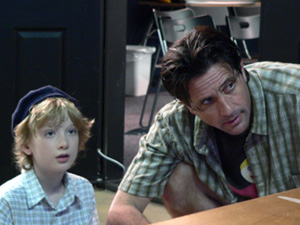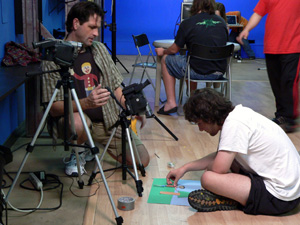
|
||
| The number of children diagnosed with autism is increasing at an accelerated rate nationwide, having grown fifteen-fold since the mid 1980's and reaching more than 1 in 100 children born in the USA today – four times more boys than girls. All this has prompted many voices to call autism an epidemic.
The investigation about the future course of education for autistic children is at the forefront of public consciousness. Recent research – as well as testimonials from parents of children who have attended Brad’s camp – indicate that developing autistic children’s creative and acting abilities significantly improves their social interaction skills, and is generally overlooked as a therapeutic tool. Footage of the all-immersive, ciné vérité week or activities is combined with revealing moments of seven Asperger Syndrome-afflicted children’s private lives, and candid interviews with their families, exploring and explaining their own coping strategies. Last but not least, the children’s artistic efforts – films, poems, paintings and music – combine to paint a soulful picture of how encouraging and training creativity is a necessary step to connect the exponentially increasing autistic population with the rest of the world. In twenty years of experience teaching 'The Celluloid Heroes Movie Camp' he created, Brad has developed a methodology of student involvement which has proven to be particularly well suited to inspire creative work from students on the autistic spectrum - from severely non-functional, to the lightest forms of Asperger’s Syndrome. By using the techniques of Improvisation created by Viola Spolin (of Chicago’s Second City fame), and the Theater Games further developed by her son Paul Sills (with whom Brad has studied), Brad creates a playful atmosphere conducive to collaboration - a particularly difficult task with autistic children who generally experience difficulties in relating to others. |
||
|
||
|
||
| ... Casey Metcalfe is a curly-haired, cherubic eleven year-old. The son of a successful Hollywood screenwriter, Casey is blessed with unstoppable energy, a permanent tendency to get himself in trouble, and an all-consuming desire to draw, not unlike that of his friend...
.... Noah Niemeyer, also eleven, raised by a single father. Noah’s obstinate refusal to bend to Casey’s artistic will makes for some of the funniest and most poignant on-screen moments this filmmaker has ever witnessed. Casey and Noah are stars! .. Stephanie Greenwald is a shy teenager who loves to swim and has won fifty-two Special Olympic medals. When she opens up and starts painting, drawing and animating her passion comes to life, and is exhilarating to watch. The development of her painter’s gift culminates in her troubling self-portrait. ... Jon Corlander, a brilliant Asperger’s teen, who has known he wanted to be a filmmaker since he was five, shares with us his troubled past as a bullied kid - as well as his incredible sense of humor. ... and, finally, Ben Anderson, a troubled teenaged rock-god-in-the-making, whose brooding musings, along with his crush on Brad’s assistant Hana, will take us to a darker place from where we will be lifted by his tremendous musical talent. Jon’s film “Stage Dog”; Noah’s “Mirage”; Ben’s “Loose Tooth”; the class silent film; Monique’s poems and music; Stephanie and Casey’s paintings and drawings; and last but certainly not least, Ben’s incredible rock’n roll are some of the artistic treats this film has in store for its viewers. The children's narrative arcs all point to the constructive, therapeutic nature of their education in the creative arts. |
||
|
||
| DIRECTOR'S STATEMENT The investigation about the future course of education for autistic children is at the forefront of public consciousness: from Time Magazine to the New York Times, from American Pediatric Magazine to People Magazine, this issue is being hotly debated; and although recent research indicates that developing autistic children’s creative and acting abilities significantly improves their social interaction skills, these methods are generally overlooked as therapeutic tools. Our film looks at several forms of art therapy as possible answers to helping these children bridge the gap that separates them from others. To anyone who's ever felt isolated or misunderstood, this labor of love is a testimony to the healing power of art. |



